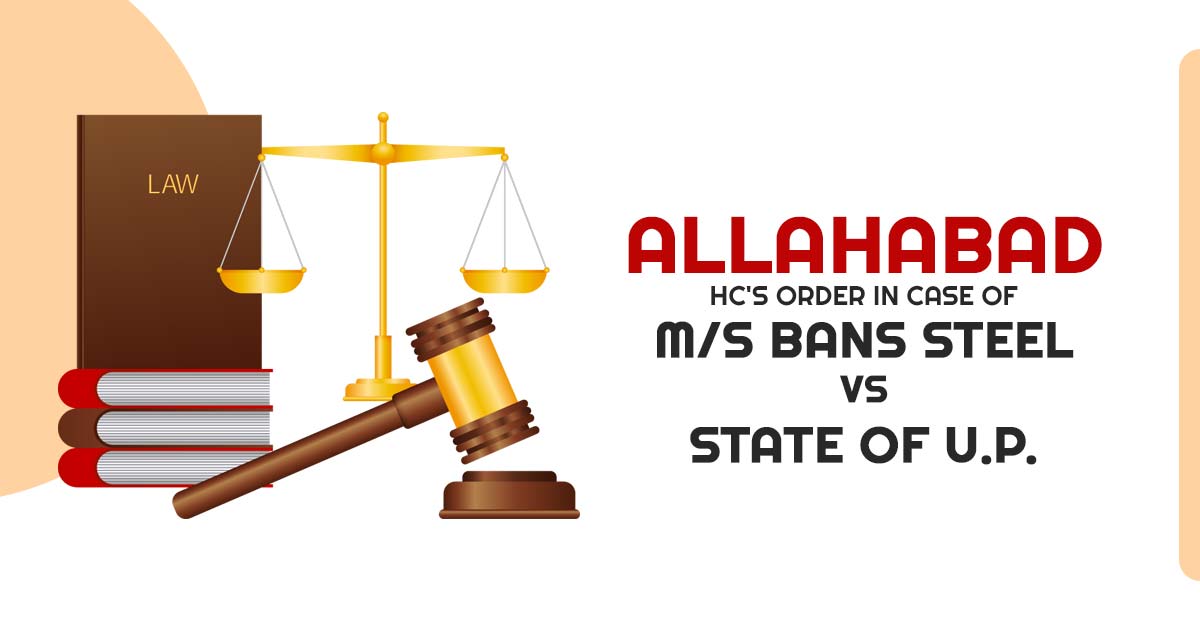
If the proper e-way bill is presented for the issuance of a seizure order, any differences are solved, directing the unwarranted arrest of the goods, Allahabad HC ruled.
Once the E-way bill is produced before the seizure order can be passed, it shall not be stated that the applicant has made any violation of the provision of the Act, Justice Piyush Agrawal mentioned.
If the e-way bill is furnished before the passing of the order of the seizure of the GST authorities then the statement of the court mentioned that goods could not be detained.
The applicant M/s Bans Steel a retail and wholesale distributor of iron and steel, was transporting goods from Punjab to Bans Steel, Uttar Pradesh, when the vehicle carrying the consignment was intercepted.
However, an e-way bill was generated for one invoice a technical error delayed the e-way bill generation for the second invoice. The applicant fixed the same by submitting the e-way bill before the seizure order was passed.
Even after the timely submission, the applicant faced a tax obligation of Rs 382,168 and an equal penalty, which was carried out by an appellate authority. The applicant argued that the submission of the e-way bill before the seizure order generated the proceedings unjustified, quoting precedents from the identical cases along with the Shri Surya Traders Vs. Union of India and M/s Havells India Ltd. Vs. State of UP and others.
The impugned order has been kept by the Additional Chief Standing Counsel ( ACSC ), claiming that the act and the rules were breached since the goods were not accompanied via the required documents during the interception.
Recommended: All About GST E-Way Bill 2 Portal with Main Benefits
It was argued by the ACSC that the absence implied an attempt to evade the tax, a stance kept by the former court judgments in the identical matters along with the M/s Akhilesh Traders Vs. State of UP and others and M/s Hawkins Cooker Limited Vs. State of UP and others.
It was claimed by the counsel that as the goods were not accompanied via the effective documents, it was good to presume that the applicant had the objective of preventing the paying of tax since the presumption was not being challenged by the applicant during the detention. He mentioned that the issue was not the only technical error, these unfilled Part III or a mistake in the e-way bill.
He asked for the dismissal of the present writ petition. Both submissions have been taken into account, and the respondent -GST department contentions have been addressed. The bench mentioned that in the matter of Hawkins Cooker, the proceedings u/s 129 of the GST Act were explained as the goods were seized due to the absence of accompanying documents.
M/s Akhilesh Traders ( supra ), the absence of both a tax invoice and an e-way bill during the detention justified the proceedings u/s 129. However, in the current case, the consignment included two separate tax invoices: no. 21 dated 12.7.2019 and no. 22 dated 12.7.2019, related to different dealers, said the court.
It was mentioned by the court that there was no dispute for the tax invoice no. 21, the e-way bill for tax invoice no. 22 was not available during detention but was subsequently produced before the seizure order. No point does the authorities emphasize any differences in the e-way bill. Therefore, the ruling quoted via ACSC does not apply to the present matter, making it ineffective for the respondent’s claim.
It was remarked by the court that no e-way bill was produced at the time of the initial inspection, it was furnished before the seizure order was finalized. Since the authorities discovered no differences in the e-way bill, the detention of the goods was considered unwarranted.
It remarked that the GST authorities have the full procedure and power that post detaining the goods if it was not accompanied with the effective documents, the survey is undergone by the authority of the business premises of the applicant to reveal the correctness of the transaction however the respondent authorities opted in their wisdom not performing the same.
The order levying the tax obligation and penalty on the applicant, asking for a refund of any deposited amount in two months has been quashed by the Single Bench of Allahabad High Court.
| Case Title | M/S Bans Steel Vs State Of U.P. |
| Citation | WRIT TAX No. – 577 of 2022 |
| Date | 09.08.2024 |
| Counsel For Petitioner | Pranjal Shukla |
| Counsel For Respondent | C.S.C. |
| Allahabad High Court | Read Order |









